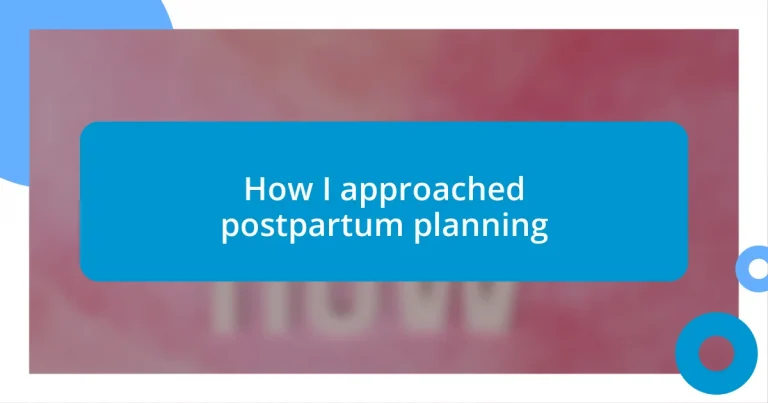Key takeaways:
- Postpartum planning is essential for anticipating challenges, focusing on practical aspects like meal prep, emotional well-being, and self-care to ease the transition into motherhood.
- Building a support network—comprising family, friends, and community groups—provides vital emotional and physical assistance, helping new parents navigate feelings of isolation and overwhelm.
- Addressing both physical recovery and mental health is crucial; prioritizing rest, nutrition, and open communication fosters a nurturing environment for both the parent and the newborn.
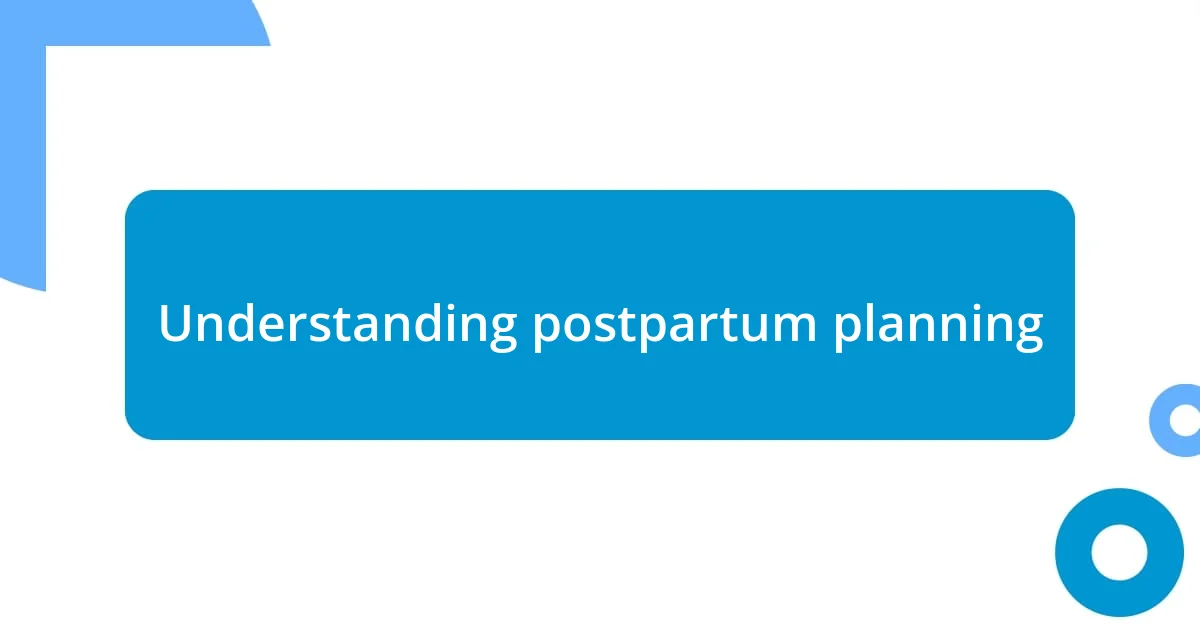
Understanding postpartum planning
Postpartum planning is all about anticipating the challenges that come after welcoming a new baby. I remember feeling overwhelmed by this massive life change, but taking the time to plan helped me feel more in control. Have you ever thought about how crucial it is to have a roadmap for such a transformative period?
When I first started my postpartum planning, I focused on practical aspects like meal prep and creating a support network. It felt like building a safety net. I vividly recall calling my friends and asking for help during those early days—just having someone drop off a meal made all the difference. Isn’t it comforting to know you’re not navigating this journey alone?
Emotional well-being is often overlooked in postpartum planning, yet it plays a significant role in adjusting to motherhood. Personally, I didn’t realize how vital self-care would be until I found myself overwhelmed with anxiety. Reflecting on how I felt those first few months drives home the importance of incorporating mental health resources into your plan—what steps can you take to prioritize your emotional needs?
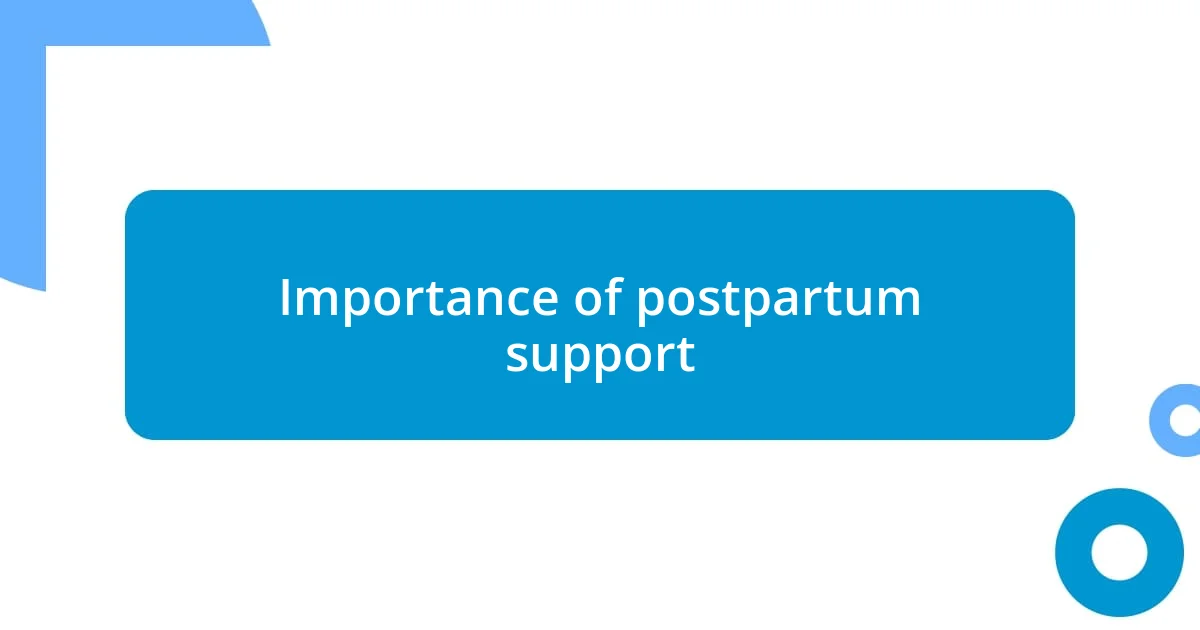
Importance of postpartum support
Postpartum support is essential for navigating the complexities of new motherhood. I remember those early weeks vividly—there were moments when just having my partner there to share responsibilities felt like a lifeline. It’s not just about help with the baby; emotional support can significantly impact mental health during this critical transition. How can we thrive if we’re isolated?
Having a robust support system helps in managing both physical and emotional challenges. When my mother stayed with us for a few weeks, her presence eased my transition. It was more than just assistance; it was about the comfort and reassurance of having someone who understood what I was going through. Can you imagine how different those nights might have been without her warm encouragement and practical tips?
Additionally, postpartum support fosters a sense of community, which is crucial for reducing feelings of loneliness that can accompany new motherhood. I found solace in local mom groups, where other mothers shared their experiences, struggles, and triumphs. Hearing their stories made my own challenges feel less daunting. What community resources are available to you to create that sense of connection?
| Type of Support | Benefits |
|---|---|
| Emotional Support | Helps reduce feelings of isolation and anxiety, fostering mental well-being. |
| Physical Support | Assists with daily tasks like meal prep and baby care, allowing new parents to rest. |
| Community Resources | Provides connection with others experiencing similar challenges, enhancing feelings of belonging. |
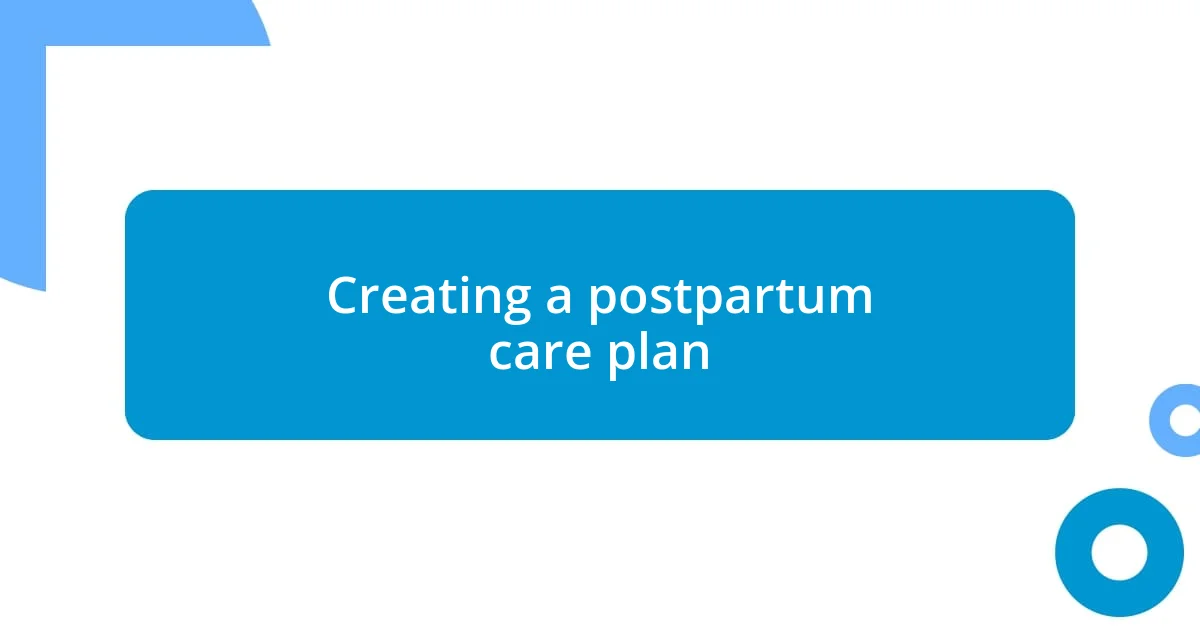
Creating a postpartum care plan
Creating a postpartum care plan was a transformative experience for me. I realized that addressing not just physical needs, but also emotional and social aspects was crucial. I remember scribbling down my thoughts late at night while feeding my newborn. It was during these quiet moments that I envisioned the support I would need. There’s something powerful about putting your plans on paper; it allowed my worries to feel more manageable.
Here are some elements I included in my postpartum care plan:
- Meal Preparation: Prepping meals ahead of time eased my daily stress and saved precious time for bonding with my baby.
- Support System: I enlisted friends and family for both emotional and physical support, knowing those connections would be my rock.
- Self-Care Activities: I scheduled small self-care moments, like bath time or a quick stroll, reminding myself it’s okay to prioritize my well-being.
- Resources for Mental Health: I researched local therapists and support groups, ensuring I had outlets for my feelings.
- Daily Routine Structure: Establishing a loose daily routine helped me find a rhythm while adjusting to life with a newborn.
The process of planning not only grounded me but also gave me hope. It was about setting the stage for a nurturing environment, recognizing that asking for help is a strength, not a weakness. I vividly remember the relief that washed over me the day my best friend dropped off a care package. It was more than food; it was a reminder that I wasn’t alone in this journey.
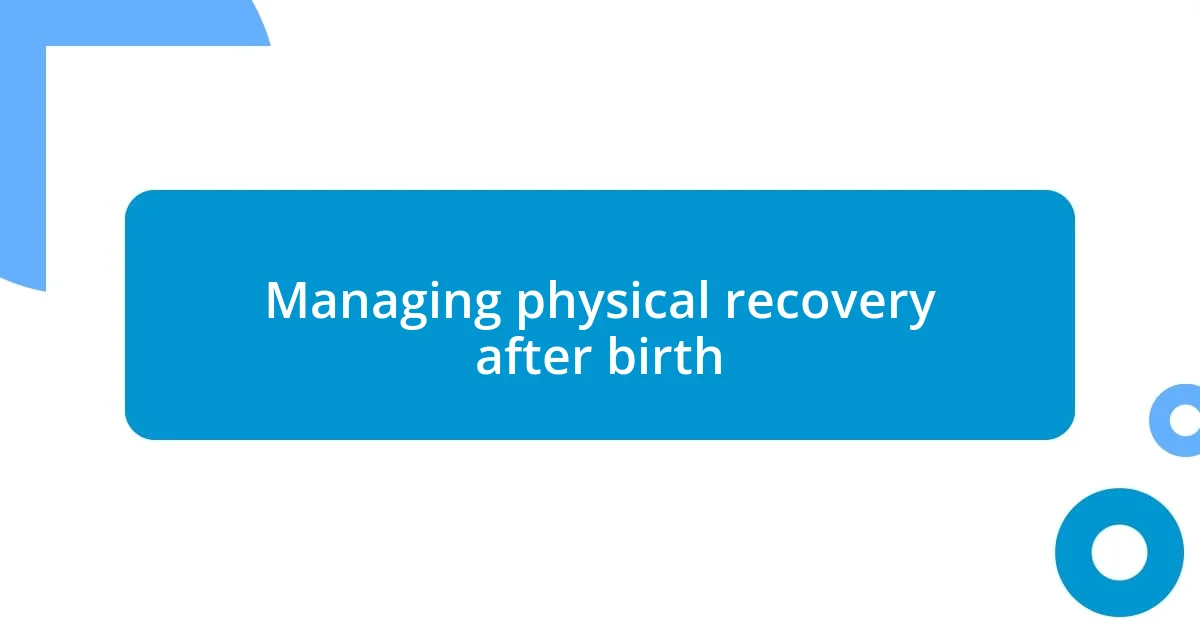
Managing physical recovery after birth
Managing physical recovery after birth is an essential aspect of the postpartum experience, yet it can feel overwhelmingly daunting. After my first delivery, I remember being surprised by how physically demanding the recovery process truly was. Simple tasks like getting out of bed or navigating stairs left me feeling drained and frustrated. Did you ever think recovery would be just as hard as labor?
One of the most crucial elements for me was listening to my body and understanding when to rest. I vividly recall those first couple of weeks when I embraced the importance of downtime. As tempting as it was to jump back into my usual routines, I learned that allowing myself to heal meant accepting help—whether that was taking a nap when my baby napped or asking my partner to handle household chores. It’s remarkable how prioritizing rest transformed my recovery experience. Remember, your body has just done something incredible; it deserves kindness and patience.
Nutrition also played a pivotal role in my physical recovery. I found that nourishing my body with wholesome foods significantly impacted my energy levels. I began incorporating iron-rich foods into my meals, and I still recall the comforting embrace of a warm soup my neighbor brought over. It felt like she was giving me a warm hug through her cooking. How often do we overlook the power of good nutrition during recovery, though? Little changes to my diet not only supported my healing but also fortified me for those endless sleepless nights.
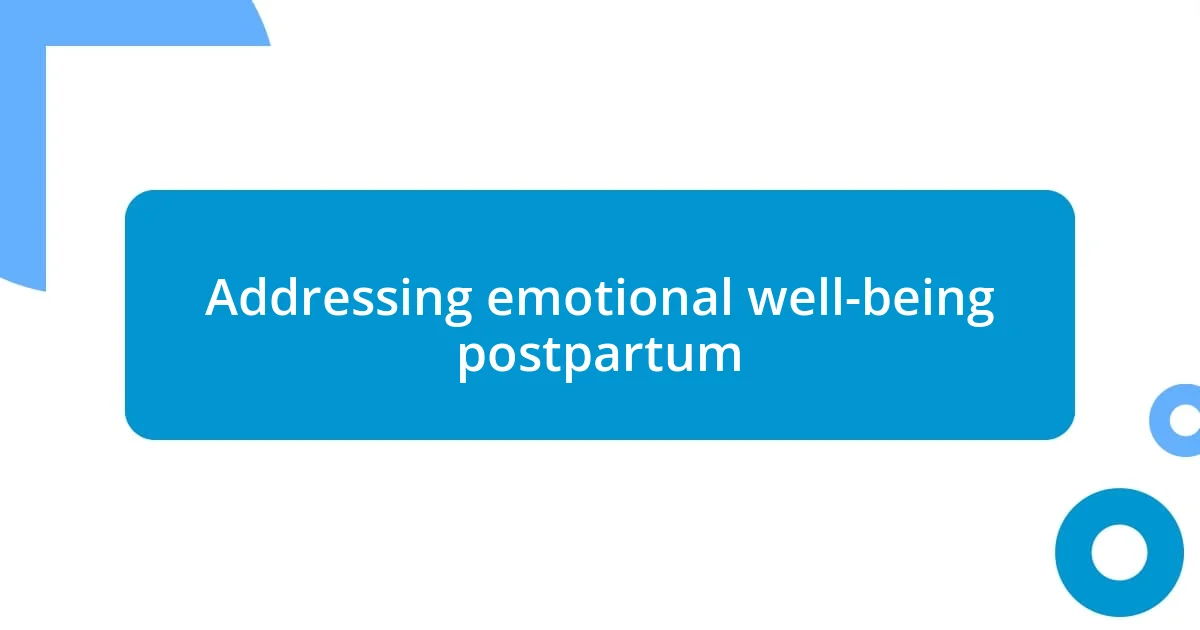
Addressing emotional well-being postpartum
Addressing emotional well-being postpartum is an often overlooked but vital part of the journey. I vividly remember those early days when the joy of my newborn clashed with an overwhelming wave of emotions. Have you ever felt that paradox, where happiness and sadness seem to coexist? For me, it was essential to acknowledge these feelings rather than suppress them. I found solace in talking openly with my partner about my emotional ups and downs, which not only strengthened our bond but also created a safe space for vulnerability.
Creating a dedicated time for reflection became a nourishing practice for my mental health. I started journaling my thoughts and fears in the quiet moments of the night, particularly during late-night feedings—a habit that evolved into a lifeline. How transformative is it to see your feelings laid out before you? It was liberating to unravel my thoughts on paper, allowing me to gain clarity and understand myself better. I still cherish those entries; they’re not just filled with struggles but also snippets of joy that remind me how far I’ve come.
Moreover, connecting with others going through similar experiences proved invaluable. I reached out to a local postpartum group and found a sense of community that was surprisingly comforting. Sharing stories and hearing how others navigated their emotional landscapes helped me recognize that I wasn’t alone. Isn’t it amazing how connection can heal? Those group meetings became a beacon of hope for me, where laughter often punctuated the air, and the weight of isolation lifted, if only for a moment.
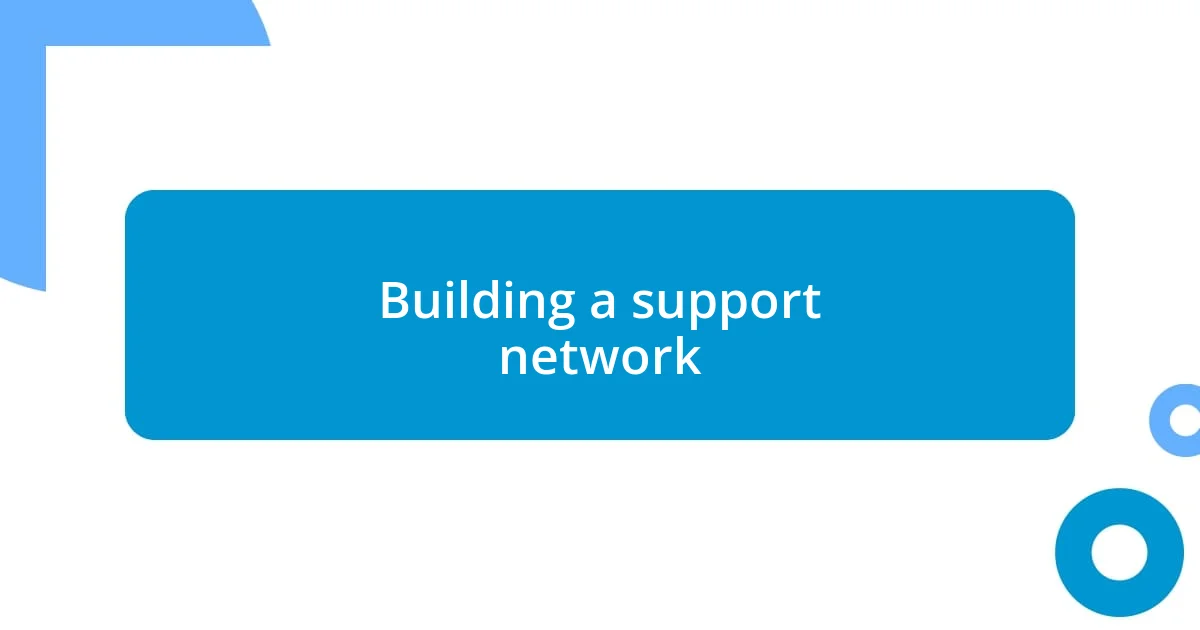
Building a support network
Building a support network during the postpartum period was a game changer for me. Early on, I learned I couldn’t do it all alone, and I vividly recall the day I reached out to my childhood friend, who had recently become a mom herself. We exchanged texts filled with questions and advice—it felt like I was tapping into a hidden reservoir of understanding. Have you ever experienced that rush of relief when someone else just “gets it”?
While some of my friends were far away, others were nearby and eager to help. I arranged playdates and coffee catch-ups, which not only gave me a break but also allowed me to share my experiences—as well as my challenges. I still remember how uplifting it was to hear laughter echoing in my living room as we traded stories about sleepless nights and diaper disasters. It was a reminder that no matter how tough things felt, I had a squad who would stand by me without judgment. Have you thought about who your support network could include?
Joining online forums and social media groups also provided an unexpected layer of support. I was amazed at how many people shared their struggles and victories, even as we navigated life behind screens. One evening, I posted about feeling overwhelmed, and within minutes, a flood of responses poured in, each one a comforting digital hug. That sense of camaraderie helped me realize that building a support network is not just about having local friends, but also connecting with a broader community that understands parenthood’s complexities.
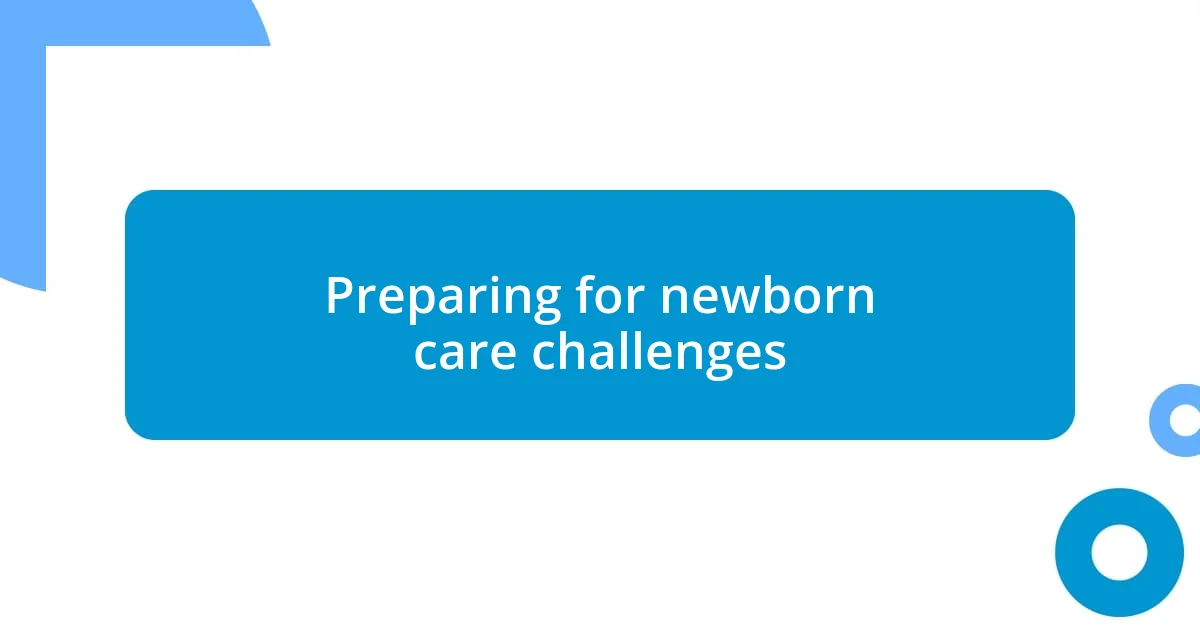
Preparing for newborn care challenges
When it comes to newborn care challenges, anticipating the chaos is half the battle. I remember the first time I changed a diaper; it felt like the wildest roller coaster ride. Have you ever encountered that mixture of excitement and sheer terror? I quickly learned that preparing myself mentally for those messy moments—from blowouts to midnight feedings—was critical. I started creating a list of potential challenges I might face, which included everything from colicky crying spells to figuring out how to manage sleep deprivation.
In those chaotic early weeks, I also found it incredibly helpful to keep essential supplies organized and accessible. Picture this: bleary-eyed at 2 AM, I fumbled through cluttered drawers, desperately searching for a pacifier. Now, I can smile about it, but in that moment, I wished I had better prepared. I discovered that designating a “newborn care station” near my sleeping area made a world of difference. Stocking it with diapers, wipes, and even extra blankets alleviated a lot of stress. Isn’t it fascinating how a little organization can transform potential challenges into manageable tasks?
One specific challenge I faced was dealing with a particularly fussy day. My baby cried inconsolably, and I felt like I was in the eye of a storm. I reached out to my mom, who had faced similar struggles when I was a baby. Listening to her recount how she too felt overwhelmed helped diffuse my anxiety. It hit me then—sharing our experiences not only normalizes the stress but also presents solutions we may not have considered. Have you ever found solace in the wisdom of someone who’s been there before? The connection it creates transforms those daunting newborn care challenges into shared experiences, paving the way for greater understanding and resilience in parenthood.












